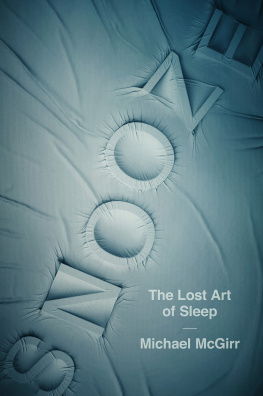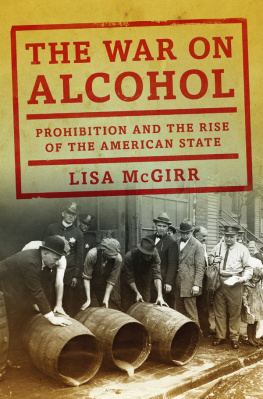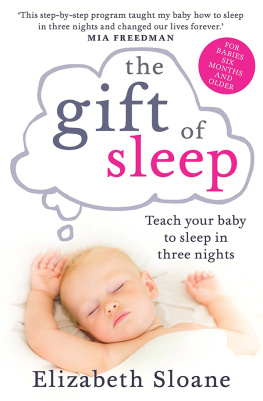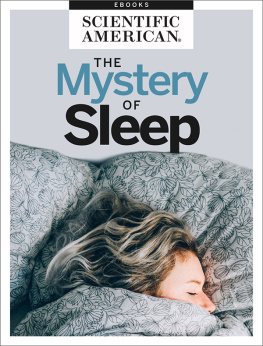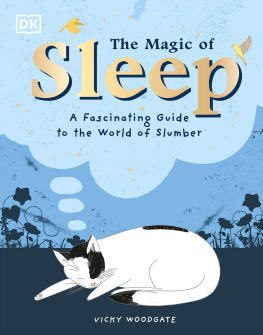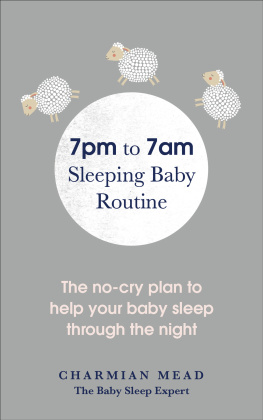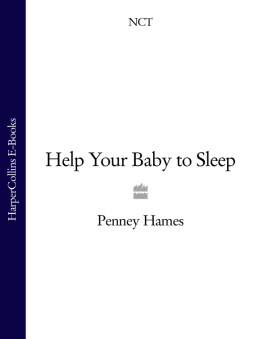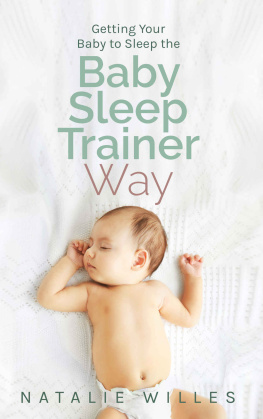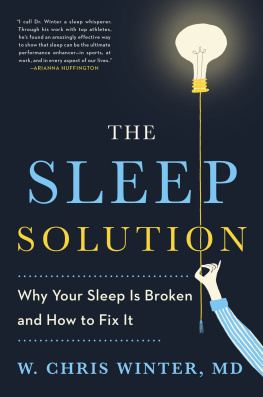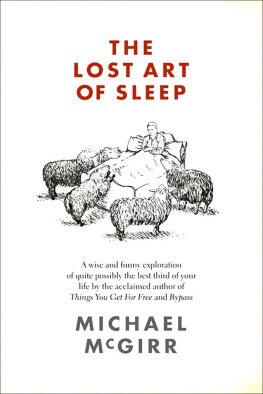

S NOOZE
Pegasus Books Ltd
148 West 37th Street, 13th Floor
New York, NY 10018
Copyright 2017 by Michael McGirr
First Pegasus Books hardcover edition June 2017
Interior design by Sabrina Plomiatallo-Gonzlez, Pegasus Books
All rights reserved. No part of this book may be reproduced in whole or in part without written permission from the publisher, except by reviewers who may quote brief excerpts in connection with a review in a newspaper, magazine, or electronic publication; nor may any part of this book be reproduced, stored in a retrieval system, or transmitted in any form or by any means electronic, mechanical, photocopying, recording, or other, without written permission from the publisher.
ISBN: 978-1-68177-419-0
ISBN: 978-1-68177-479-4 (e-book)
Distributed by W. W. Norton & Company, Inc.
For Benedict, Jacob and Clare
And for Tony Flynn
O sleep! it is a gentle thing,
Beloved from pole to pole!
The Rime of the Ancient Mariner , Samuel Taylor Coleridge
I only know that while I sleep I have no fear, nor hope,
nor trouble, nor glory. God bless the inventor of sleep.
Don Quixote , Miguel de Cervantes
I wish I could write a chapter upon sleep and yet,
as fine as it is, I would undertake to write a dozen chapters
upon button-holes, both quicker and with more fame,
than a single chapter upon this.
The Life and Opinions of Tristram Shandy , Laurence Sterne

S pare a thought for Rip Van Winkle, the man who slept through the American Revolution. His story is one of a number of fairy tales in which sleep is a spooky kind of experience. In this world, sleep can start with a curse from an old fairy, end with a kiss from a young prince, and last anywhere up to one hundred years. Such fables have always made curious bedtime readingthe purpose of which is surely to encourage children to surrender to the world on the other side of their closed eyes, not to be frightened of it.
Like many people, I first met Rip Van Winkle in my pajamas. It was 1969, and our bedtime was 8:00 PM . Mum had read in Womens Weekly , or somewhere like that, that the astronauts who went to the moon had begun life by always being in bed by 8:00 PM . We were going to follow their example, at least as far as sleep was concerned, so there we were, tucked in bed when Rip Van Winkle arrived. He came after our prayers, traveling in a large volume of childrens stories that had the cover falling off. In this volume of wonders, people did all sorts of strange things that never happened anywhere near our rather staid family. They slept in forests and castles and glades (whatever they were). There was even an old woman who lived in a shoe. She had so many children that she could sleep anywhere, I suppose.
In an attempt to avoid his nagging wife, Rip Van Winkle went to sleep just before the American Revolution and then slept for twenty years. He woke up in a United States of America that had successfully untethered itself from the British monarchy and found that he himself had also been freed from his domestic obligations, as his wife had died while he was asleep. Two decades of sleep is a mediocre effort by the standards of Sleeping Beauty and various others. But, stillin an age well before wed coined that turn of phrase FOMO (fear of missing out)I remember being somewhat disturbed by old Rips story. Sleep had deprived him of a ringside seat in one of the greatest moments in history. Was this supposed to be a fairy tale or a horror story?
This is a book about sleep. In the history of human civilization, sleep is the unrivaled hero. It is the wellspring of creativity. In sleep, we are most ourselves because we have to surrender our egos. It is the space in which so much happens, mainly because, while we are asleep, we cant squeeze any extra appointments or make any extra phone calls or look at one more thing on the Internet. Sleep is the daily visit that people who live in crowded diaries make to a wide-open space.
Sleep has piqued my interest because it has been a point of struggle for me throughout my life. I have lived with a few significant sleep disorders, starting with a diagnosis of sleep apnea twenty years ago when I was working as a Jesuit priest. I had spent most of my life being tired when my wife and Ialready parents of a one-year-oldhad twins. It was then that I learned what sleep deprivation truly was. But this is not a guidebook. I am not a clinician of any sort. I wont be telling you when to go to bed, how to prepare for bed, what to eat before bed or when to turn off your TV, phone, iPad, iPod, computer, or any other gadget. (The irony of modern living is the image of someone sitting up in bed looking up sleep techniques in the search engine on their computer. Its as silly as driving to the gym. Worse. Its like drinking to achieve sobriety.) If you do want help with sleep, there are plenty of good books available, full of sound advice.
This is not one of those books. My only clinical advice is pretty basic: If you are struggling with insomnia or nightmares or a sleep disorder, try to read a bit and talk to someone before automatically reaching for pills as a solution. Be wary of giving sleep problems a medical name before they really need them; insomnia is a pathology whereas poor sleep is just an inconvenience. The pair can look similar. It requires wisdom to know the difference; our problems often grow into the names we choose to give them.
This is a book about more than sleep. It is an exploration of the role of sleep in our history and culture. There is some information about my own experience, but I also reach more broadly to look at some of the most famous wakers and sleepers in history. It is also a book about the opposite of sleepthe phenomenon of not sleeping and what this kind of exhaustion means for society. The whole world is like an overtired baby. It screams at us incessantly when what it most wants is a decent sleep.
Theres an old saying that says insomnia is nothing to lose sleep over. That is a simplistic statement, but it does contain a grain of truth. So instead, in the wee hours of the morning, when sleep eludes you, you now have this book.

I n the end, it only took one man to change the lightbulb.
Thomas Edison patented over a thousand bright ideas in his lifetime, although his name is remembered for maybe half a dozen of them. But the ones with which he is commonly associated are household items that changed the way people lived.
By the age of fifteen, Edisonwho had a paltry formal education and a noted inability to sit still, but a habit of reading books compulsively left his home in Port Huron, Michigan, to become a telegraph operator. The telegraph had at last solved the problem that had cost the runner his life after the battle of Marathon: no longer did messages need to be delivered in person. And Edison loved it. As a teenage telegraph worker, he won standing among his colleagues for the speed of his work and for his willingness to work nights, meaning they didnt have to. While others drank, Edison studied. He read everything about electricity and warmed to the work of Michael Faradaya man, like himself, who had started in obscurity. Faraday, author of Experimental Researches in Electricity , had also quit school early; he then used the spare time left over from menial jobs to inch his way through the Encyclopedia Britannica . In 1831, Faraday created the first electric generator. He turned electricity from a mysterious, even spiritual, abstraction into something that could be manufactured and sold, a commodity that only needed the right master to put it to work. Edison would become one of the first of those masters and the most entrepreneurial.
Next page
